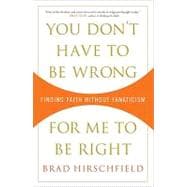
Note: Supplemental materials are not guaranteed with Rental or Used book purchases.
Purchase Benefits
Looking to rent a book? Rent You Don't Have to Be Wrong for Me to Be Right Finding Faith Without Fanaticism [ISBN: 9780307382986] for the semester, quarter, and short term or search our site for other textbooks by HIRSCHFIELD, BRAD. Renting a textbook can save you up to 90% from the cost of buying.
| Introduction | p. 1 |
| The Many Faces of Faith: Finding Faith Without Fanaticism | p. 15 |
| Pilgrims, Tourists, and Seekers: Marrying Openness and Commitment | p. 37 |
| The Shadow Side of Faith: Learning That We Can Be Both Victims and Victimizers | p. 61 |
| Vengeance, Forgiveness, Justice, and Mercy: Recognizing the Sacredness of All Our Feelings | p. 81 |
| Keeping Score: Making Judgments Without Becoming Judgmental | p. 105 |
| Mosquechurchagogue: Finding Unity, Not Forcing Uniformity | p. 131 |
| The Bishop of Auschwitz: When the Whole Really is Greater than the Sum of the Parts | p. 155 |
| Adam and Eve Were Not the Cosbys: Learning That You Don't have to Disconnect Because you Disagree | p. 183 |
| A Person's a Person, No Matter How Small: Talking about the Things that Matter Most in the Way that Hurts the Least | p. 205 |
| The Footprints of the Messiah: Turning Our Deepest Dreams into an Everyday Reality | p. 227 |
| Bibliography | p. 249 |
| Acknowledgments | p. 255 |
| Index | p. 263 |
| Table of Contents provided by Ingram. All Rights Reserved. |
The New copy of this book will include any supplemental materials advertised. Please check the title of the book to determine if it should include any access cards, study guides, lab manuals, CDs, etc.
The Used, Rental and eBook copies of this book are not guaranteed to include any supplemental materials. Typically, only the book itself is included. This is true even if the title states it includes any access cards, study guides, lab manuals, CDs, etc.
Excerpted from You Don't Have to Be Wrong for Me to Be Right: Finding Faith Without Fanaticism by Brad Hirschfield
All rights reserved by the original copyright owners. Excerpts are provided for display purposes only and may not be reproduced, reprinted or distributed without the written permission of the publisher.